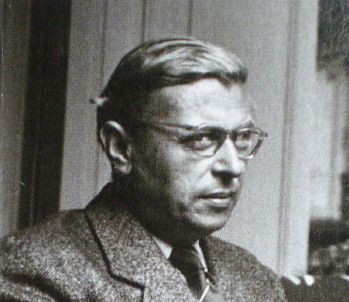June 21: Jean-Paul Sartre (1905)
 It was on this date, June 21, 1905, that French existentialist philosopher Jean-Paul Sartre was born in Paris. Through his mother, Anne-Marie Schweitzer, Sartre was a great nephew of medical missionary Albert Schweitzer. He grew up fatherless and was reared by his grandfather, who called him Poulou. Working as a teacher from 1931 to 1945 he also traveled in Egypt, Greece, and Italy. In Berlin Sartre studied the writings of the German philosophers Edmund Husserl and Martin Heidegger, as well as Voltaire, Hugo, and Flaubert. But his philosophy of Existentialism may also have been a product of the madness and brutality of World War Two. As Sartre said in a lecture on 29 October 1945,
It was on this date, June 21, 1905, that French existentialist philosopher Jean-Paul Sartre was born in Paris. Through his mother, Anne-Marie Schweitzer, Sartre was a great nephew of medical missionary Albert Schweitzer. He grew up fatherless and was reared by his grandfather, who called him Poulou. Working as a teacher from 1931 to 1945 he also traveled in Egypt, Greece, and Italy. In Berlin Sartre studied the writings of the German philosophers Edmund Husserl and Martin Heidegger, as well as Voltaire, Hugo, and Flaubert. But his philosophy of Existentialism may also have been a product of the madness and brutality of World War Two. As Sartre said in a lecture on 29 October 1945,
There are two kinds of existentialists. There are, on the one hand, the Christians ... and on the other the existential atheists, amongst whom we must place Heidegger as well as the French existentialists and myself. (at Club Maintenant, Paris)
Sartre's Existentialist idea was that life is meaningless and that people must fashion their own purpose out of the materials at hand; that God or Nature or whatever power may exist above mankind doesn't enforce any moral code — that ideas of right and wrong, good and evil, have no cosmic meaning; and that "free will" is a curse and a chain, not a blessing and a freedom. Summing up, Sartre said,
The existentialist ... finds it extremely embarrassing that God does not exist, for there disappears with him all possibilities of finding values in an intelligible heaven. ... Existentialism isn't so atheistic that it wears itself out showing that God doesn't exist. Rather, it declares that even if God did exist, that would change nothing. ... we think the problem of his existence is not the issue. [ibid]
The idea that personal choice and individual effort are the keys to achieving one's goals, without reference to God, sounds very much like a Protestant work ethic without the deity. As Sartre said,
Man can will nothing unless he has first understood that he must count no one but himself; that he is alone, abandoned on earth in the midst of his infinite responsibilities, without help, with no other aim than the one he sets himself, with no other destiny than the one he forges for himself on this earth." (from L'Être et le Néant; Engl. trans., Being and Nothingness, 1943)
Distinguishing himself as a novelist and playwright, as well as a philosopher and teacher, Sartre wrote such works as Nausea (1938), Being and Nothingness (1943), Existentialism and Humanism (1946), and a three-volume biography of the Atheist Gustave Flaubert called The Family Idiot (1971-1972). He won the Nobel Prize for literature in 1964. Although never a Communist, Sartre supported the Stalinists until they turned Russia into a reactionary abattoir. He was friends with Albert Camus, until they broke over the policies of the Soviet Union, and had a lifelong love affair with fellow Atheist and Existentialist Simone de Beauvoir.
Sartre died in Paris on 15 April 1980. As he said in a Life magazine interview the year he won the Nobel,
We have lost religion but we have gained humanism. The ideal now is to liberate and to help emancipate mankind, with the result that man becomes really an absolute for man. (Life, 6 November 1964)

